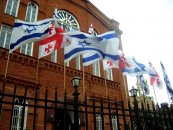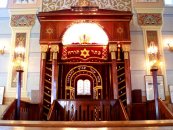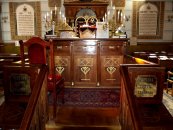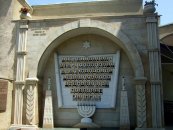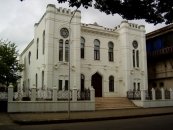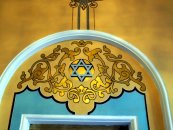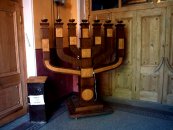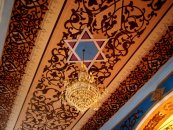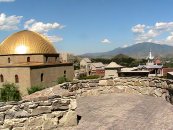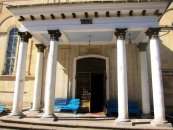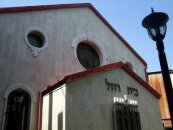|
As a result of living together in Georgia during 26 centuries, Jews emerged as a distinct ethnic group – the Georgian Jews. You cannot definitely assert that the community really never been harassed, but objectively, these afflictions mostly were local and never initiated by Georgians. And it is fundamentally different history of Jews who lived among Georgian people. Tolerance in Georgia has deep roots. World known opinion about “choseness” of Jewish people was well known to Georgians, accordingly, genealogy of Georgian kings (ruling country in the X-XVIII centuries) were connected with biblical characters, calling themselves the descendants of Jesse, David and Solomon, who gave birth to Christ. Beginning of the state ideology starts here. According to the Georgian historical accounts Lord’s tunic was brought to Georgia by Elios, Jewish citizen of Mtskheta (Georgia). In the country allocated to the Virgin Mary, Jew from Mtskheta – Elios was one of contributor to Georgian Christianity.
Naturally, harassment and physical extermination of the Jewish people in this country was impossible. Georgian Jewry was naturally included in the life of Georgian society. Dynamic national consciousness of Jews was reflected in the mass emigration of the early 1970s thanks to the prevailing moral climate of friendly Georgia. It has to be mentioned that Georgia and Israel governments have good relationships long time already. At difficult period for Georgia at 1992-1993 Israel was one of the first foreign states opened its embassy in Tbilisi and started sending humanitarian supplies: medicines, clothing, food, miscellaneous equipments.
In September 1998, Georgia celebrated the 2600th anniversary of cohabitation Georgian and Jewish peoples. This significant date was celebrated at the state level. "This is one of the most important historic events I attended in entire period of my work," – said the head of the Israeli delegation, now president Moshe Katsav in September 9th, 1998 at the meeting with the president of Georgia, Eduard Shevardnadze, – We cannot yet fully appreciate the enormous importance of this event, we are talking about the history of 26 centuries of peaceful coexistence..."
According to various account the Jewish population is from 8 to 12 thousand in Georgia today and most of them live in the capital. There are two synagogues in Tbilisi, Ashkenazi and Sephardi, and Yeshiva-College "Or Emet," School-header "Tiferet Zvi."
Existence of Jewry in Georgia is mentioned in the annals of "Kartlis Tskhovreba". Their first appearance in the country is associated with the destruction of the First Temple (586 BCE). The earliest archaeological evidence of the presence of Jews in Georgia – gravestones with inscriptions in Hebrew and Aramaic languages was found near the former capital of Georgia – Mtskheta, dating from III-IV centuries.
It is reported that first Jewish settled in Zanavi – ancient Georgia countryside, near Mtskheta (maybe that was a suburb or quarter of Mtskheta at that time), in 586 BC after the Babylonian king Nebuchadnezzar II destroyed Jerusalem and the Temple in Jerusalem, and the Jews were deported. We can assume that this fact was reflected in the arrival of Jews from Babylonia to Georgia. In 539 BC the southern part of Babylonia came under the Old Persian Achaemenid (558-330 BC) control. From the South Georgia Jews gradually settled in other areas of the country.
11th century Georgian historian Leonti Mroveli in the annals of "The Life of Kartli" describes the fact of the settlement of Jews in Zanavi. He says: “When the king Novuhodonosor captured Jerusalem, the Jews who had fled from there came to Kartli and Mtskheta and asked the Rulers piece of land to settle on. He gave them land [place] near the river Aragvi called Zanavi... A few years later the king of Persia became son of Spandiata Baram, known by the name of Ardashir, who surpassed all the kings of Persia. He conquered Babylon and Assyria, made Greeks and Romans ??tributary countries. At the same time, Kartli turned tributary country too. And there were mixed tribes living in Kartli, they spoke six languages??: Armenian, Georgian, Khazary, Syriac, Hebrew and Greek. Every the kings of Kartli, all men and women talked these languages”.... From the context of historical account it is clear that Jews in Zanavi actually had autonomy and private land.
Unfortunately, we have little information about the life of Georgian Jews in the Middle Ages, no detailed descriptions of life in the era of independence and prosperity of Georgia (1089-1213), which began from the period of the reign of David the Builder. However, Marco Polo, who visited the country in 1272, noted that "Christians live in Tiflis – Georgians and Armenians, as well as Muslims and Jews.”
Nathan Eliashvili in his book about the history of Georgian Jews (1926) notes that Georgians are by nature hospitable and warmly welcome every visitor at home. Georgians felt to be an honor and their moral duty to welcome Jews, because they considered that their beloved and venerated royal dynasty of Bagrationi had Jewish origin.
Georgian Jews communicate in Georgian in everyday life – in some Georgian highland (for example, Svaneti, Khevsureti, Tusheti) historical legends associated with the transition of their ancestors in the Jewish faith are still preserved. Furthermore, in one of the Svanetian high villages is still kept scroll of ancient Torah as a relic. Until the mid-20th century Svan elders, making important decisions swore on this scroll, although they were Orthodox Christians for many centuries.
In the first half of the XIX century Georgia experienced economic prosperity, which was naturally reflected in the lives of Jews. Construction of roads, railways, expansion of ports, the development of industry and agriculture have contributed to the revival of trade that led to significant demographic changes. Entire communities have migrated from rural to urban areas. New communities emerged in Sukhumi, Poti, Batumi, along the Black Sea coast. Small community of Tbilisi significantly increased at that time.
The fact that Georgia became part of the Russian Empire in 1801 changed the economic, political and social situation of the Jews. From the beginning they welcomed Russian government, but they soon felt anti-Semitism. There were positive aspects too in the accession of Georgia to Russia: a link between the Georgian and Russian Jewish communities gradually established. Decree of 1804 included the Caucasus region in the Pale of Settlement. It allowed Russian Jews to settle in Georgia. Jews were attracted by economic opportunities and a mild climate. Ashkenazim had professions that somehow facilitate entry of Russian – Jewish culture into Georgian. Among Ashkenazims were pharmacists, doctors, tailors, jewelers, watchmakers, etc. Communication between local and foreign Jews was initially very limited. They did not know each other's language and could not communicate properly. To establish genuine cooperation between two Jewish communities was first commenced by Zionists. General idea of ??Zionism began to spread among the Georgian Jews in the second half of the nineteenth century, making hundreds of families left for Eretz Yisroel (The land of Israel).
No matter how life evolved Georgian Jews, no matter what tendencies they influenced by, the most important always was to have a part of Eretz Yisroel (The land of Israel). Nathan Eliashvili wrote: "Love and desire to Eretz Yisrael (The land of Israel) was profound. All their life Jews dreamed to leave for Eretz Yisroel and see it by own eyes, or die there at their old age."
Holy Land was of paramount importance for the Christian Georgians too. Georgian Christians made ??pilgrimages to Palestine for centuries; they built their churches, monasteries there. Georgian monasteries appeared on Mount Sinai, in Bethlehem, Jerusalem. The most popular among them is the Monastery of the Holy Cross in Jerusalem, where according to legend Shota Rustaveli – the greatest Georgian poet of XII c. – was buried.
In the 1950s, economic development of Georgia was accelerated, and the financial situation of the Jews began to improve. In the 60s, hundreds of Jews were taught in high schools. They studied science, industry, art, and later, they occupied prominent positions in the society. The majority followed religion and traditions of their ancestors. Despite more than half a century of communist domination, Georgian Jews followed traditions: the covenant of circumcision, a private wedding ceremony, kosher laws, they celebrated the Sabbath and all Jewish holidays. Georgian Jewish community has always cared about kosher food, baked Matza and financially supported synagogues. During the Soviet period the same was not observed among the Russian Jews communities.
In the beginning of the 70s, about 30,000 people left Georgia for Israel.
After the collapse of the Soviet Union, many Georgian Jews visited their relatives in Israel, and they start to visit the lands where they were born. This had a great impact on various aspects of Jewish life in Georgia. It increased national awareness; the process of cultural development of Jewish life was actively launched. At the same time those who left Georgia felt their deep connection with the Georgian people and got compassionate in their struggle for self-determination. In Israel, they have arranged a strong brotherhood and preserved Georgian language.
Besides Tbilisi, small Jewish communities exist in Kutaisi, Gori, Batumi, Surami, Kareli, Akhaltsykhe and in some other towns. By the mid-90s Jewish settlements got almost empty. For example, just newly established Museum of Georgian-Jewish friendship reminds the Jewish presence in the town except synagogues and cemeteries in Kulashi.
History of Kutaisi
Jews lived mainly in the north-east of the city – Kutaisi, on the left bank of the river Rioni. This place was called street Shaumyani. This area was settled more compact by Jews than the other ones. Time has changed a lot, even the name of the street. Today the street is called after Gaponov. Boris Gaponov has translated "The Knight in the Panther's Skin". He enriched Jewish culture and glorified Georgian culture in Israel. He was awarded with Rustaveli Prize – the highest national award. As time passed, most of the Jews left Kutaisi for their historic homeland. A small number of the remaining Jewish families do not live so compact, and you can rarely hear that particular speech characterizing Georgian Jews. But it can be heard in the speech of Georgians who continue to live on the street Shaumyani and it will still be heard for many years in this area.
Small synagogue remained in Kutaisi pertaining to this time, in 1835 a second synagogue was built, known as the Upper or Mtsvane Kvavili. In 1886, the third synagogue was built known as the "Great Synagogue". Jews who stayed in Kutaisi now gather there in the morning and in the evening. Very often prayer does not start as long as worship requires the presence of 10 men older than 13 years – "the Minyan". Two men stay in the synagogue of Kutaisi whole day long from the morning until the evening. They are the keepers. They open the doors for the tourists from Israel... they keep books. There is actually nobody to read these books. Those who come to pray do not know Hebrew. Any synagogue, library and even a museum can be proud of these books. Nowhere else you can find the Babylonian Talmud printed in Warsaw 150 years ago, a prayer book printed in Hamburg the same 150 years ago. Whole store of books covered with dust and mold, piled in heaps on the chairs – no one is sitting on.
History of Batumi
The Jewish community was founded in 1878, after the city became part of the Russian Empire. One of the refineries owned by the Rothschild family in the company of Russian Jews, and they financed construction of the synagogue. Synagogue was closed over the years several times, but in spring 1993 synagogue was returned to the Jewish community. Jewish synagogue located in Batumi is similar to the synagogues of Hague and Amsterdam.
The center of Jewish life today is Tbilisi. There are the rabbis living in Tbilisi as well as Mohels and etc. Today there are Sephardic and Ashkenazi synagogues.
|
|


